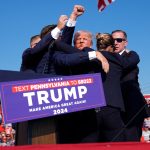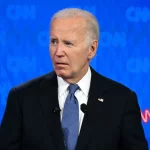
By ANDREW C. MCCARTHY. Media: Nationalreview
You don’t have to support Trump to worry that the criminal charges against him will set a dangerous, norm-breaking precedent.
In a column Monday, I addressed the political significance of Judge Tanya Chutkan’s ruling that former president Donald Trump does not have immunity from criminal prosecution. Trump posited his immunity claim in a federal criminal prosecution on four felony charges arising out of his actions in the two months between the November 2020 presidential election and the January 6, 2021, Capitol riot.
The ruling makes it highly likely that, starting on March 4, the favorite to be the 2024 Republican presidential nominee will spend two to three months of the campaign standing trial on four felony counts before a jury in Trump-hostile Washington, D.C., in a case brought by the Biden Justice Department’s special counsel, Jack Smith, and presided over by Judge Chutkan, an Obama appointee whose disdain for Trump is barely concealed. Under federal law, Trump will have to attend his trial every day. Combined, the felony charges carry a statutory maximum prison term of 55 years. A conviction on even one count is likely to call for an incarceration sentence under the federal guidelines. Hence, if Trump is convicted, he faces the very real possibility of being ordered to begin serving a prison term during the campaign stretch-run. (If Trump were convicted in May, he’d likely be sentenced in August. The presumption in federal law is against bail pending appeal.)
Here, I will address the conclusion of Judge Chutkan’s 48-page opinion that former presidents lack immunity from criminal prosecution for acts within the broad parameters of their executive duties.
As I said in the Monday column, while I don’t agree with all of her reasoning, the judge appropriately applied the Supreme Court’s most relevant precedent. The Court has never ruled squarely on the immunity question in the criminal-prosecution context. The closest it has come is its 1982 decision in Nixon v. Fitzgerald. There, a 5–4 majority ruled that former presidents have immunity from civil lawsuits for actions within the ambit of official executive duties.
In Fitzgerald, the deeply divided Court’s multiple opinions, taken together, strongly suggested that the case would have come out the other way if the issue had been criminal, rather than civil, liability. Technically, these suggestions were nonbinding dicta because the criminal issue was not before the Court. Still, lower-court judges should never ignore consensus commentary from the Supreme Court, even if it is non-binding. (I am not suggesting that Judge Chutkan would have been inclined to ignore the Fitzgerald dicta; she clearly agrees with it.) It was thus reasonable for the judge to construe Fitzgerald’s dicta as dooming Trump’s immunity claim.
Chutkan also had the benefit of other cases that, while not directly on point, trend in favor of denying immunity. In United States v. Nixon (1974), for example, the Court held that even sitting presidents must comply with a trial subpoena demanding evidence (President Nixon’s infamous White House tapes) for use in a criminal prosecution. In addition, in a pair of 2020 cases, Trump v. Vance and Mazars v. Trump, the Court ruled that then-president Trump and his accountants had to comply with, respectively, a state grand-jury subpoena and a congressional subpoena demanding many years’ worth of financial records. In Clinton v. Jones (1997), moreover, the Court held that the unparalleled breadth and importance of a president’s responsibilities, which the justices acknowledged, do not justify granting a president immunity, during his presidency, from civil lawsuits alleging private (not official) misconduct.
It is not sufficient, then, to say Chutkan’s decision was defensible. It was the decision a lower-court judge should have reached under the circumstances.
Still, the Supreme Court should grant review of Trump’s immunity claim. It is a critically important issue that is certain to recur. To be sure, the Court does not have to take the case, and it will want to avoid the white-hot politics of the 2024 election. Yet, the Court has never decided the question, and there are significant reasons, in our age of politicized prosecutions, to question whether it makes sense to distinguish a president’s fear of being sued civilly (the Court’s rationale for granting immunity in Fitzgerald) from the fear of criminal prosecution (which is at least equally paralyzing and is no longer discouraged by a norm).
In my humble opinion, the Supreme Court has never wrestled with this issue because it very rarely comes up in a first-world democratic republic, where the major parties grasp their high interest in not weaponizing law enforcement against rivals. It’s not just that, inevitably, the worm turns. A healthy republic is heavily dependent on the rule of law, a prerequisite for which is the perception of non-partisan evenhandedness — our own constitutional commitment to equal protection of law.
The Constitution doesn’t speak directly to this. The high Court’s reasoning in granting presidents immunity from civil suits is derived from separation-of-powers principles and a wider berth for judicial policy-making than we abide today.
Maybe Judge Chutkan is right that there should not be presidential immunity from criminal prosecution. After all, who couldn’t imagine situations in which a president commits a heinous crime under color of official duty that cries out for indictment? Say, for example, there were evidence of Trump’s directly ordering an attack on the Capitol (there’s not), or a president’s ordering the armed forces to arrest a political foe on baseless charges. We’d all see the sense in criminal prosecution. Impeachment and removal would seem necessary but insufficient, and it is undeniable that the Constitution expressly permits prosecution in the courts apart from impeachment; as Judge Chutkan correctly observed, impeachment carries no double-jeopardy protection.
On the other hand, just because you can do something doesn’t mean you should. Not that long ago, we had a better grasp of that.
In 2001, when I was still a federal prosecutor, the Justice Department considered criminal charges against former president Clinton, and even a theory that Hillary Clinton may have conspired with him, in connection with his final-day corrupt pardons. During my involvement in the probe, I argued that the investigation should be closed; Clinton’s pardons were clearly within his power as president, and the constitutionality of inquiring into his motives for exercising his undoubted authority seemed dubious, at best. We were operating under a live norm that our political views were irrelevant — I opposed the Clintons, and many of my colleagues on the other side of our internal legal debate were Democrats who supported the Clintons politically but were righteously appalled by the pardons. But the Rubicon we were all staring at was this: Should a new Justice Department of the opposition party prosecute the former president for actions that, even if egregious, were within his constitutional warrant — and over which he might have been impeached had he not already left office? In the end, the Bush Justice Department would not cross that Rubicon. That was the right call, because even if there may have been a prosecutable case, preserving the norm was more important.
Things have changed a lot in the last two decades.
Notwithstanding the “lock her up” fervor of the 2016 election, the Trump Justice Department did not pursue criminal charges against Hillary Clinton. But then it emerged that the Obama/Biden Justice Department had green-lit an aggressive counterintelligence and criminal investigation of Trump based on the bogus premises that he (a) might be a treasonous agent of Russia, and (b) might have committed felony obstruction of justice by exercising his constitutional prerogative to fire the Obama-appointed FBI director — who, despite repeatedly assuring the president that he was not a suspect, expressly intimated to Congress and the public that he might well be in cahoots with the Kremlin.
After the country was put through that escapade for over two years, congressional Democrats launched a partisan impeachment of Trump over an allegation — namely, that he had pressured Ukraine to investigate the Bidens (over what genuinely appears to have been corruption) — that was so sketchy House Democrats could not come up with a relevant criminal violation to cite when they wrote their impeachment article. (They called it “abuse of power,” though they did add a potential crime, obstruction of Congress, in a second impeachment article. To be clear, impeachment doesn’t require a penal offense, but it is customary to have one if the misconduct at issue is serious enough to warrant impeachment.)
After Trump’s post-2020 election shenanigans, Democrats shattered congressional norms in forming up a House panel — the January 6 committee — to which Republicans were refused the right to appoint their chosen members to fill minority seats, and on which only anti-Trumpers were permitted to sit. The committee held performances, rather than hearings, permitting neither cross-examination nor alternative perspectives. When Trump advisers Steve Bannon and Peter Navarro declined to cooperate with the committee, the Biden Justice Department prosecuted them for contempt — a move with few historical precedents that hadn’t been made in about 40 years (despite there having been, in prior decades, no shortage of noncompliance with congressional demands). The committee issued a predictably damning report calling for criminal prosecution of Trump, after which the Biden Justice Department named a special counsel to indict him.
In the interim, the Biden Justice Department commenced a scorched-earth investigation aimed at promoting the Democratic Party storyline — elucidated by the House Democrats’ “Incitement of Insurrection” impeachment article against Trump — that American democracy was besieged by hordes of white-supremacist domestic terrorists (i.e., Trump supporters or, as President Biden and other Democrats put it, “MAGA Republicans”). Obviously, all Americans should support the prosecution of the people who violently attacked police and forced their way into the Capitol. In the event, however, the Biden Justice Department prosecuted hundreds of people on trifling misdemeanor offenses that would never have been charged in normal cases untainted by partisan politics.
Meantime, the Biden Justice Department largely turned a blind eye to left-wing rioting that was considerably more extensive in time, scope, and lethality than the Capitol riot. Biden prosecutors even intervened to get sentencing leniency for progressive lawyers who firebombed a New York City police squad car, as well as another progressive activist who killed a person in the course of torching a building. At the same time, the DOJ has pushed for terrorism sentencing enhancements against Capitol riot defendants, and attempted to deploy the FBI to investigate and harass parents who protested against progressive indoctrination in the schools. Yet the same Justice Department refused to prosecute pro-abortion activists who illegally protested at the homes of Supreme Court justices — even as it aggressively prosecuted pro-life activists who protested outside abortion clinics.
Trump has now been indicted four times, twice by the Biden Justice Department and twice by elected progressive Democratic state prosecutors (in Manhattan and Atlanta). By comparison, the Biden Justice Department has willfully slow-walked a criminal investigation of the Biden family business of monetizing Joe Biden’s political influence. Although Congress has traced $24 million in payments to Biden family members from agents of corrupt and anti-American regimes, the Biden Justice Department has allowed the statute of limitations to lapse in connection with some of the most outrageous transactions (the ones that occurred when Biden was vice president from 2014 through 2016). The president’s son, Hunter Biden, was belatedly indicted on gun charges only after the Biden Justice Department’s prosecutor was scandalously exposed upon trying to make the case disappear with no gun prosecution and a no-jail sweetheart plea to misdemeanor tax offenses that should have been charged as felonies. (Late this week, Hunter Biden was finally indicted on tax charges.) And while former president Trump has been indicted for mishandling national-defense intelligence (the same offense for which Hillary Clinton was given a pass), a similar investigation of President Biden’s mishandling of national-defense intelligence while he was vice president and a senator is reportedly being closed without charges by a Biden Justice Department special counsel.
This unabashedly discriminatory law enforcement is going to cause blowback. Trump has described himself as the candidate who, if elected, will deliver “retribution.” An important part of his appeal to his base supporters is the expectation that he would use the federal law-enforcement apparatus to pursue criminal investigations, prosecutions, and civil lawsuits against Democrats and their progressive-activist allies, including in the media. That, in fact, is what galvanized Trump’s support in the GOP primary contest — to the point that there has been no contest, with other candidates unable to get traction as Trump’s legal travails dominate the press coverage. Trump thus leads his GOP rivals by 40 points or more. In fact, he is now leading Biden in several major polls; that may be a temporary phenomenon, as I believe it is, but many Democratic election strategists, who know a lot more about this stuff than I do, are beginning to panic, worried that they’ve way overplayed their hand, as they did when they salivated over the prospect of running against Trump in 2016.
Understand: I do not subscribe to the Trump philosophy that to beat the Democrats you have to adopt the Democrats’ tactics. I am not against investigations of political corruption and abuse — far from it. But I believe law enforcement should only intrude on politics if there is clear evidence of serious crimes, and that the principal check on presidential misconduct should be impeachment, not criminal prosecution. Unfortunately, that view seems antediluvian these days. There is no reason to believe Democrats will retreat from two-tiered justice, and an increasing number of Republican supporters expect their candidates to respond in kind if they are returned to power. As I said in Monday’s column, I hate the new normal, but I am not deluding myself into believing that it’s not the new normal.
As detailed above, Judge Chutkan’s immunity opinion is at its strongest when she teases out the trajectory of prior precedent that bends toward her “no immunity” conclusion. It is at its weakest, however, when she peremptorily dismisses the reality that henceforth, presidents — including the incumbent president — must fear that a subsequent administration, if led by their political opponents, could investigate, prosecute, and sue them over policy disagreements, and particularly over the questioning of election results (which is not something Trump invented, as Democrats, more than anyone, should recall).
According to Chutkan, any concerns about future prosecution can only be salutary. Such fears, she calculates, would induce the sitting president to follow the law. By her lights, then, in our world, there are only two kinds of germane actors: potentially corrupt presidents and pillar-of-rectitude prosecutors who scrupulously enforce the law free of partisanship or prejudice.
Down here on Planet Earth, though, we have politicized prosecution. Indeed, while Chutkan acknowledges the potential that presidents may engage in corruption, it seems not to dawn on her at all that a particularly heinous form of presidential corruption would be a leveraging of executive police powers for partisan advantage.
It is simply not reality that presidents need only fear prosecution if they violate the law. They must now fear that their official acts will become grist for politically motivated prosecutors (or, more broadly, a politically motivated administration of the opposite party) to pursue criminal investigations and charges based on (a) highly debatable constructions of criminal statutes and (b) mindreadings of the former presidents’ intent and motives.
Trump’s election-interference prosecution is a case in point. We are not talking here about obvious federal crimes to be proved by clear, undeniable evidence. As I argued in the Monday column, Jack Smith’s invocations of fraud, obstruction, and civil-rights statutes are a reach, at best. No honest analyst thinks this case is a slam dunk on appeal. Smith is trying to slide Capitol riot proof into the case, but that’s a stretch, too, since he hasn’t charged Trump with a riot crime — precisely because he lacks evidence that Trump committed incitement or otherwise conspired in a forcible attack.
Moreover, Chutkan’s observation that Trump will not be convicted unless Smith can prove he was lying when he made stolen-election claims underscores that the case hinges not on clear criminal actions, but on a post facto assessment by a subordinate executive official (the prosecutor) of the former chief executive’s state of mind in carrying out his official duties. (And before you start throwing stuff at me over that, if we were talking about a Democratic president, no one would claim that challenging election results and fretting about vote fraud, even on flimsy evidence and legal theories, was outside the ambit of legitimate executive action.)
I can’t say with confidence that the Supreme Court would conclude that presidents should have immunity from prosecution for official acts. To the contrary, (a) the current Court, with its originalist-leaning majority, is less apt than the Fitzgerald Court, of a more freewheeling era, to root decisions in policy rather than Constitutional text; (b) no one claims immunity, even from civil lawsuits, is in the Constitution’s text; (c) in fact, the Constitution expressly anticipates that corrupt presidents could face legal sanctions separate and apart from impeachment; and (d) if, as is likely, the immunity issue comes before the Court in the context of Trump’s prosecutions, there will be great pressure on the Trump appointees not to be seen as protecting him, the chief justice will want nothing to do with a case drenched in 2024 electoral politics, and the three progressive judges will surely side with the progressive prosecutor and against Trump.
All that said, though, it is simply a fact that, in the present day, the justification for immunity in the criminal context is no different from that which led the Fitzgerald Court to grant it in the civil context:
Because of the singular importance of the President’s duties, diversion of his energies by concern with private lawsuits would raise unique risks to the effective functioning of government. . . . [A] President must concern himself with matters likely to arouse the most intense feelings. . . . Yet, as our decisions have recognized, it is in precisely such cases that there exists the greatest public interest in providing an official the maximum ability to deal fearlessly and impartially with the duties of his office. . . . This concern is compelling where the officeholder must make the most sensitive and far-reaching decisions entrusted to any official under our constitutional system. [Citations and quotations omitted.]
It might have been sensible to distinguish concerns about private lawsuits from concerns about criminal prosecution when we had a norm against the latter. It was then understood that both parties had an incentive to refrain from the banana-republic practice of exploiting police powers for partisan purposes and settling political scores. Over time, President Ford’s pardon of President Nixon came to be seen, rightly, as an exercise in statesmanship that spared not only Nixon but, more consequentially, the republic from the substantial downsides of a criminal prosecution over abuses of presidential power. (Of course, as Judge Chutkan rightly points out, Ford wouldn’t have issued the pardon, nor would Nixon have accepted it, unless both presidents believed that Nixon had no immunity from prosecution.)
Now, however, Ford-style statesmanship seems quaint. Now, presidential candidates and lawyers seeking state- and district-attorney posts wear their determination to wield police powers for partisan ends as a badge of honor — what should be a disqualification has become a platform. Henceforth, all presidents will have to worry, while exercising their powers, about politicized prosecutions after they leave office. In fact, President Biden would be crazy if he did not, as his last official act in office, pardon himself and his subordinates for actions taken during his administration (in addition, of course, to pardoning his son). In the new normal, such pardons, which would previously have been seen as an outrageous abuse of power and an implied admission of guilt, will be understood as insurance against the next administration’s weaponization of the FBI and Justice Department.
Judge Chutkan opined that criminal prosecution was saliently different from private civil lawsuits because it reflects the communal judgment of the nation — that’s why she stressed that the case at issue is called United States of America v. Donald J. Trump. That is fantasy. Partisan Democrats and the blocs of Republicans and independents who despise Trump are supportive of the prosecutions. Trump supporters and Trump skeptics who believe the Biden administration politicizes law enforcement have contempt for the prosecutions. It’s common sense: How could the prosecution of a former president be seen as bringing the nation together in a communal vindication of the rule of law when every indictment increases Trump’s favorability ratings? Even if you don’t believe that will last — I certainly don’t — it does demonstrate something that won’t change: A sizable plurality of the public is convinced that the Trump prosecutions are a terrible idea — for many not because they like Trump but because they worry about what the prosecutions portend.
They are right to be convinced of that. All id all the time, Democrats and the Trump-obsessed are gleeful at the prospect that the bane of their existence will be convicted and sentenced to a federal penitentiary. But they will come to regret this. Even those of us who believe Trump should have been impeached and should never be president again should also recognize that prosecution is not the way to ensure that.
If anything, it has made his return to the office more likely.





























































































